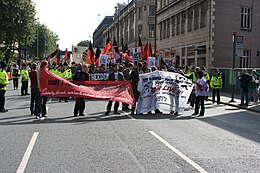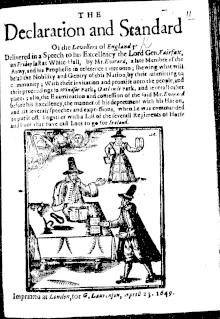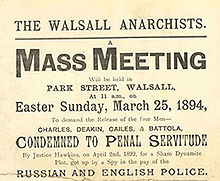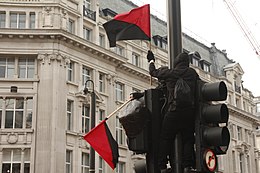Anarchism in the United Kingdom

| Part of a series on |
| Anarchism |
|---|
 |
|
|
Anarchism in the United Kingdom initially developed within the context of radical Whiggery and Protestant religious dissent. Both during the English Civil War and the First Industrial Revolution, English anarchist thought developed in the context of revolutionary working class politics and an anti-establishment ethos.
History[]

The terms "anarchy" and "anarchism" came widely into use in the time around the English Civil War. In the lead up to the conflict, radical republican and democratic ideas were first starting to circulate, advocating the abolition of existing institutions such as the monarchy, church and feudalism. In December 1640, 15,000 Londoners presented Parliament with the "Root and Branch petition", advocating for the abolition of the episcopacy, a proposition which was denounced as "absolute Anarchism" by the royalist MP Edward Dering.[1] When the Bill itself failed to pass, anti-clerical riots erupted in London,[2] eventually forcing Charles I to flee the capital, along with royalist MPs and bishops, which allowed parliament the means to pass anti-clerical bills into law.[3]
The tensions exacerbated by this situation eventually erupted into the First English Civil War, in which Parliamentarians and Covenanters were victorious over the royalist forces. Following the conflict, a radical group known as the Levellers released a series of manifestos regarding the creation of a new constitution, which became subject to debate among the parliamentary forces, as the Levellers advocated for a number of issues including progressive taxation, universal manhood suffrage and equality before the law.[4] The radical democratic theses of the Levellers was rejected by Oliver Cromwell, who accused them of advocating the cantonalist practices of the Swiss Confederacy and declared that such policies would inevitably lead to "anarchy". The Levellers denied the charge, but stayed firm on their egalitarian principles.[5]
Following the Parliamentarian victory in the Second English Civil War, the removal of dissenting voices from the House of Commons and the execution of Charles I, power lay entirely in the hands of the Grandees of the New Model Army. Unwilling to implement the radical policies advanced by the Levellers, the Grandees instead turned towards mysticism and the implementation of a Puritan religious order. But this new environment of Christian mysticism branched out into a variety of anti-authoritarian strains, with a number of English Dissenters separating entirely from the Church of England. These religious dissenters included the Quakers, Ranters, Anabaptists, Familists and Diggers.[6] Notably, the Ranters and Diggers have been labelled as "anarchists" by historians, due to their radical egalitarian philosophies and communist practices.[7] The Diggers believed in creating an egalitarian society of small agrarian communities and put this into practice by occupying a number of tracts of common land for the purposes of farming it, but these settlements were eventually suppressed by the authorities of the Commonwealth.[8]
By 1653, Parliament had been forcibly dissolved by the New Model Army and the republican Commonwealth was replaced by a military dictatorship known as The Protectorate, with Oliver Cromwell acting as Lord Protector. After Cromwell's death, Parliament was reconvened and held a Convention, which instituted the restoration of the monarchy. Within decades the Stuart-ruled kingdoms of England and Scotland were united into the Kingdom of Great Britain and the British Empire was formally established. The eventual spread of the Age of Enlightenment to Britain and the outbreak of the Industrial Revolution brought about a number of changes to the country, which allowed for the early conception of a formalized anarchist philosophy.
William Godwin[]

Modern anarchism sprang from the secular or religious thought of the Enlightenment, particularly Jean-Jacques Rousseau's arguments for the moral centrality of freedom.[9] From this climate William Godwin developed what many consider the first expression of modern anarchist thought.[10] Godwin was, according to Peter Kropotkin, "the first to formulate the political and economical conceptions of anarchism, even though he did not give that name to the ideas developed in his work". In 1793, William Godwin, who has often[11] been cited as the first anarchist, wrote Political Justice, which some consider to be the first expression of anarchism.[10][12] Godwin, a philosophical anarchist, from a rationalist and utilitarian basis opposed revolutionary action and saw a minimal state as a present "necessary evil" that would become increasingly irrelevant and powerless by the gradual spread of knowledge.[10][13]
19th century to World War II[]
In the late nineteenth century, opposition to the existing order of society and a feeling that one could do without it, was not uncommon. It varied from the gradualist support for the English republic of Charles Bradlaugh to the revolutionary republicanism of Algernon Charles Swinburne, to the anarcho-socialism of William Morris and Oscar Wilde to the full-blown anarchism of Peter Kropotkin and his sympathisers. The Socialist League was an early revolutionary socialist organisation in the United Kingdom. Around the middle of this same year, 1887, anarchists began to outnumber socialists in the Socialist League.[14] The 3rd Annual Conference, held in London on 29 May 1887 marked the change, with a majority of the 24 delegates voting in favor of an anarchist-sponsored resolution declaring that "This conference endorses the policy of abstention from parliamentary action, hitherto pursued by the League, and sees no sufficient reason for altering it."[15] Frederick Engels, living in London and a very interested observer in the League's affairs, saw the role of William Morris as decisive. He recounted the events of the 3rd Conference to his friend Friedrich Sorge in a 4 June 1887 letter:
"The anarchist elements which had gained admission to [the conference of the Socialist League] were victorious, being supported by Morris, who has a mortal hatred of all things parliamentary... Resolution — in itself quite innocuous as there can after all be no question of parliamentary action here and now — adopted by 17 votes to 11...
"What really clinched the matter was Morris' declaration that he would quit the moment any parliamentary action was accepted in principle. And since Morris makes good the Commonweal's deficit to the tune of £4 a week, this was for many the decisive factor.
"Our people now intend to get the provinces organised, which they are at present well on the way to doing, and to call an extraordinary conference in about three or four months' time with a view to quashing the above. But it's unlikely to succeed; in the fabrication of voting sections, the anarchists are vastly superior to ourselves and can make eight enfranchised sections out of seven men.... The anarchists, by the way, may shortly throw our people out, and that might be all to the good."[16]

As the tenor of the organisation became increasingly clear, a steady attrition of many of the group's international socialists began to take place. In August 1888, the London branch of the Socialist League to which Tussy Marx and Edward Aveling belonged seceded in favor of establishing itself as an independent organization, the Bloomsbury Socialist Society.[17] By the end of 1888 many other parliamentary-oriented individuals had exited the Socialist League to return to the SDF, with others who remained hostile to the SDF's parliamentary emphasis choosing to involve themselves in the burgeoning movement for so-called "New Unionism."[14] As the socialist factions left, the anarchist faction solidified its hold on the organisation. By 1889, the anarchist wing had completely captured the organisation. William Morris was stripped of the editorship of Commonweal in favor of Frank Kitz, an anarchist workman. Morris was left to foot the ongoing operating deficit of the publication, some £4 per week [14] — this at a time when £150 per year was the average annual family income in the kingdom.[18]
Post-war era[]
Ethel Mannin (6 October 1900[19] – 5 December 1984) was a popular British novelist, travel writer and anarchist. Mannin listed Bart de Ligt and A. S. Neill as thinkers who influenced her ideas.[20] Mannin's 1944 book Bread and Roses: A Utopian Survey and Blue-Print has been described by historian Robert Graham as setting forth "an ecological vision in opposition to the prevailing and destructive industrial organization of society".[21] When Vernon Richards and three other editors were arrested at the beginning of 1945 for attempting "to undermine the affections of members of His Majesty's Forces.",[22] Benjamin Britten, E. M. Forster, Augustus John, George Orwell, Herbert Read (chairman), Osbert Sitwell and George Woodcock set up the Freedom Defence Committee to "uphold the essential liberty of individuals and organizations, and to defend those who are persecuted for exercising their rights to freedom of speech, writing and action."[23] The Syndicalist Workers' Federation was a syndicalist group active in post-war Britain,[24] and one of the Solidarity Federation's earliest predecessors. It was formed in 1950 by members of the dissolved Anarchist Federation of Britain (not to be confused with the current Anarchist Federation which was founded as the Anarchist Communist Federation in 1986). Unlike the AFB, which was influenced by anarcho-syndicalist ideas but ultimately not syndicalist itself, the SWF decided to pursue a more definitely syndicalist, worker-centred strategy from the outset. The group joined the International Workers' Association and during the Franco era gave particular support to the Spanish resistance and the underground CNT anarcho-syndicalist union, previously involved in the 1936 Spanish Revolution and subsequent Civil War against a right-wing military coup backed by both Nazi Germany and Fascist Italy. The SWF initially had some success, but when Tom Brown, a long-term and very active member was forced out of activity, it declined until by 1979 it had only one lone branch in Manchester. The SWF then dissolved itself into the group founded as the Direct Action Movement. Its archives are held by the International Institute of Social History, and a selection of the SWFs publications have been digitally published at libcom.org.
Colin Ward was an editor of the British anarchist newspaper Freedom from 1947 to 1960, and founder/editor of the monthly anarchist journal Anarchy from 1961 until it ceased publication in 1970. There were 118 issues. It is not to be confused with the subsequent, shorter-lived magazine of the same name, sometimes referred to as Anarchy (Second Series), which was edited/published by a quite separate group.[25][26]

Over the years the Freedom editorial group included Jack Robinson, Pete Turner, Colin Ward, Nicolas Walter, Alan Albon, John Rety, Nino Staffa, Dave Mansell, Gillian Fleming, Mary Canipa, Philip Sansom, Arthur Moyse and numerous others. Clifford Harper maintained a loose association for 30 years.
Albert Meltzer was a contributor in the 1950s to Freedom before leaving in 1965 to start Wooden Shoe Press. Soon Meltzer was to become engaged in a long and bitter dispute with Vernon Richards, de facto owner of Freedom Press and principal editor of Freedom from its revival in the 1940s until the mid-1960s. It entangled several of their associates, and thus continued after their deaths.
Meltzer advocated a more firebrand, proletarian variety of anarchism, often denouncing Richards and the Freedom collective as "liberals". He was co-founder of Black Flag. His books included, Anarchism, Arguments For and Against (originally published by Cienfuegos Press),[27] The Floodgates of Anarchy (co-written with Stuart Christie) and an autobiography, I Couldn't Paint Golden Angels, published by AK Press[28] shortly before his death. Meltzer was involved in founding the Anarchist Black Cross. He joined the anarcho-syndicalist Direct Action Movement in the early 80s, remaining a member of it and its successor, the Solidarity Federation, until his death.
The leading anarcho-pacifist writer and gerontologist Alex Comfort characterised himself as an "aggressive anti-militarist". He held that pacifism rested "solely upon the historical theory of anarchism".[29][30] An active member of the Peace Pledge Union (PPU) and the Campaign for Nuclear Disarmament, he had been a conscientious objector in World War II. In 1951 Comfort was a signatory of the Authors’ World Peace Appeal. He later resigned from its committee, asserting that Soviet sympathisers now dominated the AWPA.[31] He later in the decade actively supported the Direct Action Committee against Nuclear War. A prominent member of the Committee of 100, he was imprisoned for a month, together with Bertrand Russell and others. They had refused to be bound over, not to take part in a Trafalgar Square mass protest in September 1961. Comfort is Peace and Disobedience (1946), one of many pamphlets he wrote for Peace News and PPU, and Authority and Delinquency in the Modern State (1950).[29] He exchanged public correspondence with George Orwell defending pacifism in the open letter/poem, "Letter to an American Visitor", under the pseudonym "Obadiah Hornbrooke".[32] Comfort's 1972 book The Joy of Sex earned him worldwide fame and $3 million. He regretted that he as a consequence became known as "Dr. Sex" and that his numerous other works received so little attention.[33]

On the last day of July 1964 an 18-year-old Stuart Christie departed London for Paris, where he picked up plastic explosives from the anarchist organisation Defensa Interior,[34] and then Madrid on a mission to kill General Francisco Franco. This was to be one of at least 30 attempts on the dictator's life. After his release he continued his activism in the anarchist movement in the United Kingdom, re-formed the Anarchist Black Cross and Black Flag with Albert Meltzer, was acquitted of involvement with the Angry Brigade, and started the publishing house Cienfuegos Press (later Refract Publications), which for a number of years he operated from the remote island of Sanday, Orkney, where he also edited and published a local Orcadian newspaper, The Free-Winged Eagle. Christie wrote with Meltzer, The Floodgates of Anarchy and later We, the Anarchists! A study of the Iberian Anarchist Federation (FAI) 1927-1937 (2000).[35]
Around the turn of the century, Movement Against the Monarchy demonstrated against Britain's monarchy in 1998[36] and 2000.[37][38] The anarchists planned a campaign for mid 2002.[39] Demonstrators arrested during the 2002 Golden Jubilee of Elizabeth II were later compensated for unlawful arrest.[40]
Organisations[]
Extant[]
- Freedom Press (1886–)
- Stapleton Colony (1897–)
- Solidarity Federation (1950–)
- Kate Sharpley Library (1979–)
- Class War (1983–)
- Anarchist Federation (1986–)
- Spirit of Revolt Archive (2011–)
Historical[]
- Diggers (1649–1651)
- Rose Street Club (1877–1882)
- Labour Emancipation League (1881–1884)
- Socialist League (1885–1901)
- Whiteway Colony (1898–1909)
- Communist League (1919–1920)
- Anti-Parliamentary Communist Federation (1921–1945)
- United Socialist Movement (1934–1965)
- Committee of 100 (1960–1968)
- The Angry Brigade (1970–1972)
- No War but the Class War (1990–2002)
- Reclaim The Streets (1995–2003)
- Movement Against the Monarchy (1998–2002)
- WOMBLES (1999–2010)
See also[]
- "Anarchy in the U.K.", a song by the Sex Pistols
- British Left
- History of the socialist movement in the United Kingdom
- Republicanism in the United Kingdom
References[]
- ^ Calder, Robert (1720). The Priesthood of the Old and New Testament by Succession. Edinburgh: J. Wilson. p. 118. ISBN 1171119941. OCLC 1050718495.
- ^ Smith, Steven (1979). "Almost Revolutionaries: The London Apprentices during the Civil Wars". Huntington Library Quarterly. 42 (4): 315–317. doi:10.2307/3817210. JSTOR 3817210.
- ^ Manganiello, Stephen (2004). The Concise Encyclopedia of the Revolutions and Wars of England, Scotland, and Ireland, 1639-1660. Scarecrow Press. p. 60. ISBN 978-0810851009.
- ^ Foxley, Rachel (2013). The Levellers: Radical Political Thought in the English Revolution. Manchester: Manchester University Press. p. 207. ISBN 9780719089367. OCLC 985096392.
- ^ Bookchin, Murray (1996). The Third Revolution. Vol. 1. London: Cassell. p. 115. ISBN 0304335932. OCLC 312686046.
- ^ Bookchin, Murray (1996). The Third Revolution. Vol. 1. London: Cassell. pp. 129–130. ISBN 0304335932. OCLC 312686046.
- ^ Bookchin, Murray (1996). The Third Revolution. Vol. 1. London: Cassell. pp. 131–135. ISBN 0304335932. OCLC 312686046.
- ^ Bookchin, Murray (1996). The Third Revolution. Vol. 1. London: Cassell. pp. 133–135. ISBN 0304335932. OCLC 312686046.
- ^ "Anarchism", Encarta Online Encyclopedia 2006 (UK version).
- ^ a b c Philip, Mark (2006-05-20). "William Godwin". In Zalta, Edward N. (ed.). Stanford Encyclopedia of Philosophy.
- ^ Everhart, Robert B. The Public School Monopoly: A Critical Analysis of Education and the State in American Society. Pacific Institute for Public Policy Research, 1982. p. 115.
- ^ Adams, Ian. Political Ideology Today. Manchester University Press, 2001. p. 116.
- ^ Godwin, William (1796) [1793]. Enquiry Concerning Political Justice and its Influence on Modern Morals and Manners. G.G. and J. Robinson. OCLC 2340417.
- ^ a b c Beer, A History of British Socialism, vol. 2, pg. 256.
- ^ Marx-Engels Collected Works: Volume 48. New York: International Publishers, 2001; pg. 538, fn. 95.
- ^ Frederick Engels to Friedrich Sorge, 4 June 1887. Reprinted in Marx-Engles Collected Works: Volume 48, pg. 70.
- ^ Marx-Engels Collected Works: Vol. 48, pg. 611, fn. 642.
- ^ Clayton, The Rise and Decline of Socialism in Great Britain, pg. 44.
- ^ "Ethel Mannin - Gilbert Turner Papers, 1922-1981". Emory University, Manuscript, Archives, and Rare Book Library. Archived from the original on 8 April 2013. Retrieved 19 October 2012.
- ^ Twentieth century authors, a biographical dictionary of modern literature, edited by Stanley J. Kunitz and Howard Haycraft; (Third Edition). New York, The H.W. Wilson Company, 1950 (p.905-6)
- ^ Robert Graham, Anarchism Volume Two: The Anarchist Current (1939-2006). Black Rose Books, 2009 ISBN 1551643103, (p.72-5).
- ^ George Orwell at Home pp 71-72 Freedom Press (1998)
- ^ Orwell, Sonia and Angus, Ian (eds.). The Collected Essays, Journalism and Letters of George Orwell Volume 4: In Front of Your Nose (1945-1950) (Penguin)
- ^ Encyclopedia of British and Irish Political Organizations'. United Kingdom: Pinter Publishers. 2000. ISBN 978-1855672642.
- ^ Goodway, David (2012). Anarchist Seeds Beneath the Snow: Left-Libertarian Thought and British Writers from William Morris to Colin Ward. PM Press. p. 312. ISBN 978-1-60486-667-4. Archived from the original on 2021-11-14. Retrieved 2018-11-10.
- ^ Lynd, Staughton; Grubačić, Andrej (2008). Wobblies & Zapatistas: Conversations on Anarchism, Marxism and Radical History. PM Press. p. 250. ISBN 978-1-60486-041-2. Archived from the original on 2021-11-14. Retrieved 2018-11-10.
- ^ Meltzer, Albert (1981). Anarchism: Arguments for and against. Cienfuegos Press. ISBN 9780904564440.
- ^ "I Couldn't Paint Golden Angels". AK Press. Retrieved 13 December 2021.
- ^ a b Rayner, Claire (28 March 2000). "News: Obituaries: Alex Comfort". The Guardian. London. Archived from the original on 18 September 2008. Retrieved 2008-08-23.
- ^ For discussions of Comfort's political views, see Demanding the Impossible: A History of Anarchism (1992) by Peter Marshall, and Anarchist Seeds Beneath the Snow (2006) by David Goodway.
- ^ Carissa Honeywell, A British Anarchist Tradition: Herbert Read, Alex Comfort and Colin Ward, Continuum International Publishing Group, 2011 ISBN 1441190171 (p.112).
- ^ Complete Essays, Journalism and Letters of George Orwell volume II, pg. 294-303
- ^ Martin, Douglas (20 March 2000). "Alex Comfort, 80, Dies; a Multifaceted Man Best Known for Writing 'The Joy of Sex'". The New York Times. Archived from the original on 2020-02-08. Retrieved 2008-08-23.
- ^ Keeley, Graham (21 May 2011). "Anarchist jailed over plot to kill Franco fights to clear name". The Times. London. Archived from the original on 22 July 2015. Retrieved 21 May 2011.
- ^ Christie, Stuart. "Review: We, the Anarchists! A study of the Iberian Anarchist Federation (FAI) 1927-1937". flag.blackened.net. Archived from the original on January 7, 2017.
- ^ "Anti-monarchists turned away at Palace". BBC News. 1998-10-31. Archived from the original on 2021-11-14. Retrieved 2021-11-13.
- ^ "Cheeky anarchists in palace protest". BBC News. 2000-06-03. Archived from the original on 2021-10-28. Retrieved 2021-11-13.
- ^ "Rioters 'may target Queen'". BBC News. 2000-05-10. Archived from the original on 2021-11-13. Retrieved 2021-11-13.
- ^ Harris, Paul; Wazir, Burhan (2002-03-24). "Anarchists plan jubilee mayhem". The Observer. ISSN 0029-7712. Archived from the original on 2021-11-13. Retrieved 2021-11-13.
- ^ "Jubilee protesters get damages". BBC News. 2004-02-04. Archived from the original on 2021-11-13. Retrieved 2021-11-13.
Further reading[]
- Cross, Rich (2014). "British anarchism in the era of Thatcherism". In Smith, Evan; Worley, Matthew (eds.). Against the grain: The British far left from 1956. Manchester: Manchester University Press. pp. 133–152. ISBN 978-07190-9590-0. OCLC 941255608.
- Evans, Rob (December 3, 2013). "At least four undercover spies infiltrated anarchist groups". The Guardian. ISSN 0261-3077. OCLC 757685987.
- Evans, Rob; Lewis, Paul (2014) [2013]. Undercover: The True Story of Britain's Secret Police. London: Faber and Faber. ISBN 978-1-78335-034-6. OCLC 907626188.
- Franks, Benjamin (2006). Rebel Alliances: The Means and Ends of Contemporary British Anarchisms. Edinburgh: AK Press. ISBN 1904859402. OCLC 493946935.
- Goodway, David (2006). Anarchist Seeds Beneath the Snow: Left-Libertarian Thought and British Writers from William Morris to Colin Ward. Liverpool: Liverpool University Press. ISBN 1-84631-025-3. OCLC 939862412.
- Gustav Klaus, H.; Knight, Stephen Thomas (2005). To Hell with Culture: Anarchism and Twentieth-Century British Literature. Cardiff: University of Wales Press. ISBN 0-7083-1898-3. OCLC 57575365.
- McKay, George (1996). Senseless Acts of Beauty: Cultures of Resistance since the Sixties. London: Verso. ISBN 1-85984-028-0. OCLC 982679436.
- McKay, George, ed. (1998). DiY Culture: Party & Protest in Nineties Britain. London: Verso. ISBN 1-85984-260-7. OCLC 959122840.
- Quail, John (2019) [1978]. The Slow Burning Fuse: The Lost History of the British Anarchists. Oakland: PM Press. ISBN 9781629635828. OCLC 1042080070.
- Shipway, Mark (1988). Anti Parliamentary Communism: the movement for workers' councils in Britain, 1917-45. AF-North. London: Macmillan. ISBN 033343613X. OCLC 468642120.
- Shpayer-Makov, Haia (1988). "Anarchism in British Public Opinion 1880-1914". Victorian Studies. Bloomington: Indiana University Press. 31 (4): 487–516. ISSN 0042-5222. JSTOR 3827854. OCLC 809574647.
- Tranmer, Jeremy (December 2011). "London: a capital of protest politics". Observatoire de la société britannique (11): 177–190. doi:10.4000/osb.1272. ISSN 1775-4135.
External links[]
- Oral History Collection of Pioneers on Anarchism in post war Britain at the International Institute of Social History (IISG)
- A selection of the SWFs publications at libcom.org
- Syndicalist Workers Federation (UK) Archives at the IISG
- Anarchism: Arguments for and against by Albert Meltzer – text at Spunk Library
- I Couldn't Paint Golden Angels by Albert Meltzer – text at the Kate Sharpley Library
- Anarchism in the United Kingdom
- Politics of the United Kingdom
- Anarchism by country